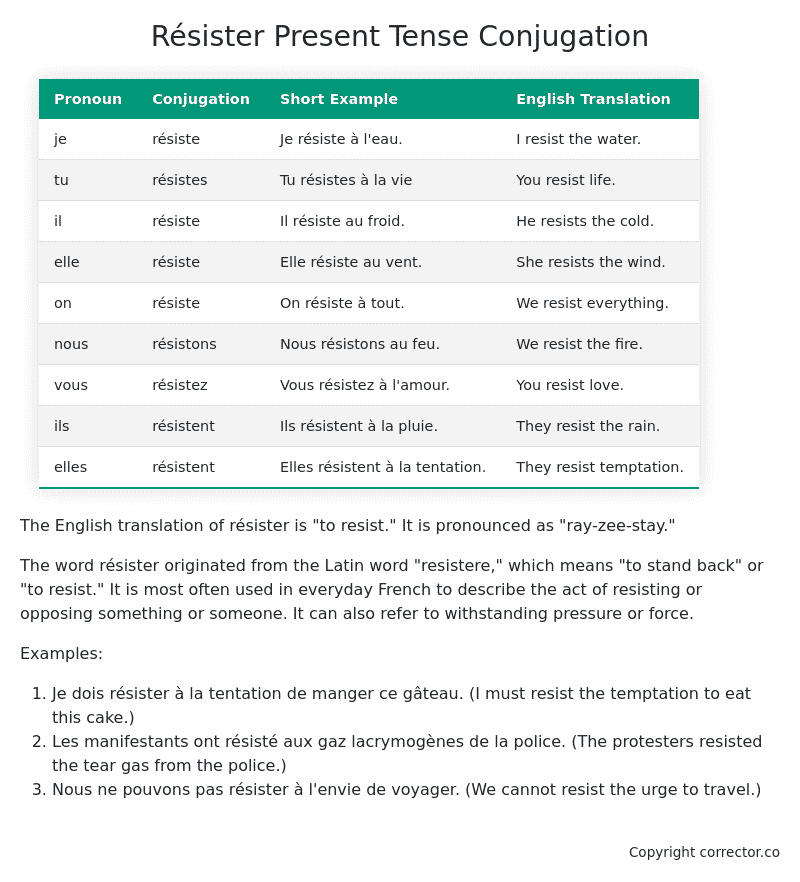Le Present (Present Tense) Conjugation of the French Verb résister
Introduction to the verb résister
The English translation of résister is “to resist.” It is pronounced as “ray-zee-stay.”
The word résister originated from the Latin word “resistere,” which means “to stand back” or “to resist.” It is most often used in everyday French to describe the act of resisting or opposing something or someone. It can also refer to withstanding pressure or force.
Examples:
- Je dois résister à la tentation de manger ce gâteau. (I must resist the temptation to eat this cake.)
- Les manifestants ont résisté aux gaz lacrymogènes de la police. (The protesters resisted the tear gas from the police.)
- Nous ne pouvons pas résister à l’envie de voyager. (We cannot resist the urge to travel.)
Résister – About the French Present Tense
To take a deep dive into all the French tenses then see our article on Mastering French Tense Conjugation.
Common Everyday Usage Patterns For Le Present
Interactions with Other Tenses
Table of the Present Tense Conjugation of résister
| Pronoun | Conjugation | Short Example | English Translation |
|---|---|---|---|
| je | résiste | Je résiste à l’eau. | I resist the water. |
| tu | résistes | Tu résistes à la vie | You resist life. |
| il | résiste | Il résiste au froid. | He resists the cold. |
| elle | résiste | Elle résiste au vent. | She resists the wind. |
| on | résiste | On résiste à tout. | We resist everything. |
| nous | résistons | Nous résistons au feu. | We resist the fire. |
| vous | résistez | Vous résistez à l’amour. | You resist love. |
| ils | résistent | Ils résistent à la pluie. | They resist the rain. |
| elles | résistent | Elles résistent à la tentation. | They resist temptation. |
Other Conjugations for Résister.
Le Present (Present Tense) Conjugation of the French Verb résister (this article)
Imparfait (Imperfect) Tense Conjugation of the French Verb résister
Passé Simple (Simple Past) Tense Conjugation of the French Verb résister
Passé Composé (Present Perfect) Tense Conjugation of the French Verb résister
Futur Simple (Simple Future) Tense Conjugation of the French Verb résister
Futur Proche (Near Future) Tense Conjugation of the French Verb résister
Plus-que-parfait (Pluperfect) Tense Conjugation of the French Verb résister
Passé Antérieur (Past Anterior) Tense Conjugation of the French Verb résister
Futur Antérieur (Future Anterior) Tense Conjugation of the French Verb résister
Subjonctif Présent (Subjunctive Present) Tense Conjugation of the French Verb résister
Subjonctif Passé (Subjunctive Past) Tense Conjugation of the French Verb résister
Subjonctif Imparfait (Subjunctive Imperfect) Tense Conjugation of the French Verb résister
Subjonctif Plus-que-parfait (Subjunctive Pluperfect) Tense Conjugation of the French Verb résister
Conditionnel Présent (Conditional Present) Tense Conjugation of the French Verb résister
Conditionnel Passé (Conditional Past) Tense Conjugation of the French Verb résister
L’impératif Présent (Imperative Present) Tense Conjugation of the French Verb résister
L’infinitif Présent (Infinitive Present) Tense Conjugation of the French Verb résister
Struggling with French verbs or the language in general? Why not use our free French Grammar Checker – no registration required!
Get a FREE Download Study Sheet of this Conjugation 🔥
Simply right click the image below, click “save image” and get your free reference for the résister Present Tense tense conjugation!

I hope you enjoyed this article on the verb résister. Still in a learning mood? Check out another TOTALLY random French verb present conjugation!


